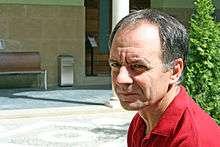Antonio Soler (novelist)
Antonio Soler (born Málaga, 28 September 1956) is a Spanish novelist, screenwriter and journalist.

Biography
Soler launched his career as a writer in 1992 with the publication of Extranjeros en la noche (Strangers in the Night), a collection of short stories and a novella – La noche (The Night), which was later published as a separate book. In 1983 he won the Jauja prize for short stories with Muerte canina (A Dog’s Death).[1]
After a further two novels he published Las bailarinas muertas (The Dead Dancing Girls), winning the Premio Herralde[2] and establishing his reputation as a key exponent of modern Spanish narrative. His following novel, El nombre que ahora digo (The Name I Now Speak), is considered by some as one of the best depictions of life in the Republican sector during the Spanish conflict. In an article in El Pais in 2014, Professor Paul Preston is quoted as saying, "I don’t like reading novels about the Civil War, but an exception was El nombre que ahora digo, written by Antonio Soler some twenty years ago, which blew me away.” (“Prefiero no leer novelas de la Guerra Civil, aunque como excepción me chifló una de Antonio Soler de hará unos veinte años: El nombre que ahora digo.”)[3] He has repeated the sentiment more recently in seminars at the Cañada Blanch Centre (LSE), commenting that it is one of the few novels to capture the sense of confusion and disorder prevailing during the siege of Madrid.
El camino de los Ingleses (Summer Rain), published in 2004, was made into a film in 2006 by Antonio Banderas using Soler's own filmscript.[4]
Soler was writer in residence at Dickinson College, Pennsylvania, and has given courses and lectures at numerous universities and cultural institutions in Europe, Latin America, the US and Canada.[5] He is a founder member of the Order of Finnegans, a literary group created in honour of James Joyce's novel Ulysses, which takes its name from a pub in Dalkey, Ireland.[6] The other four founding members are Eduardo Lago, Jordi Soler, Enrique Vila-Matas and Malcolm Otero Barral.
Bibliography
Short stories
- 1992 - Extranjeros en la noche (Strangers in the Night), including the novella La Noche (The Night).
Novels
- 1993 - Modelo de pasión (Model of Passion). Premio Andalucía de Novela.[7]
- 1995 - Los héroes de la frontera (Heroes of the Frontier). Premio Andalucía de la Crítica.
- 1996 - Las bailarinas muertas (The Dead Dancing Girls). Premio Herralde and Premio de la Crítica.
- 1999 - El nombre que ahora digo (The Name I Now Speak). Premio Primavera.
- 2001 - El espiritista melancólico (The Melancholy Spiritualist).
- 2004 - El camino de los ingleses (Summer Rain). Premio Nadal.
- 2006 - El sueño del caimán (The Sleeping Alligator).
- 2010 - Lausana (Lausanne).
- 2012 - Boabdil.
- 2013 - Una historia violenta (A Violent History).
- 2016 - Apóstoles y asesinos (Apostles and Assassins).
- 2018 - Sur (Down South). Premio Narrativa Juan Goytisolo;[8] Premio Francisco Umbral; Premio Andalucía de la Crítica; Premio El Público de Canal Sud Radio y Televisión; Premio Literario Casa Leopoldo; Premio Nacional de la Crítica
Essays
- 2010 - Málaga, Paraíso Perdido (Málaga, Paradise Lost).
Translations
Several of his novels have been translated into a number of languages, including German, Greek, French, Italian, Portuguese, Rumanian, Lithuanian, Croatian and Korean.
References
- "Diputación de Cultura y Educación, Málaga".
- "El País 05Nov1996".
- "Interview with Paul Preston, El País, 26Dec2014".
- IMDb page for Summer Rain.
- "Dickinson College, Pennysilvania".
- "The Irish Times, 16Jun2010".
- "Antonio Soler wins Premio Andalucía, El País, 01Mar1993".
- "Antonio Soler wins Premio Narrativa Juan Goytisolo, El Mundo, 24Jun2018".